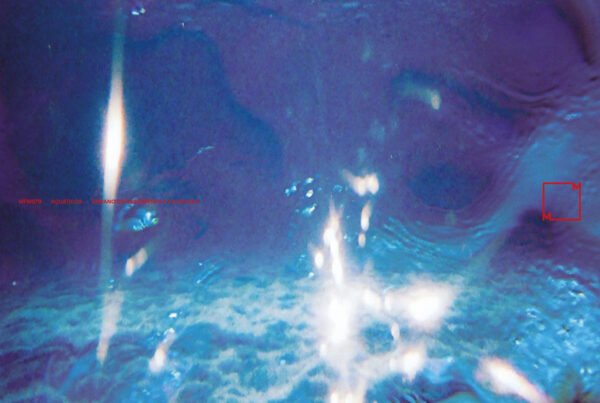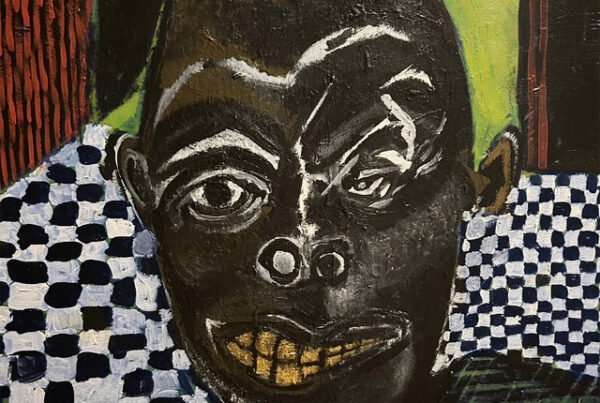In the wild world of Gautier Serre’s Igorrr project, Amen is a savage exploration of sonic mayhem.
Release date: September 19, 2025 | Metal Blade Records | Instagram | Facebook | Bandcamp
The video for French experimental band Igorrr‘s new single “Headbutt” begins with Gautier Serre off-camera, talking to an excavator operator. The operator looks slightly bemused, if not a little uncomfortable. ‘At the end of “Headbutt” there is one note,’ Serre says. ‘So I have to hit it with an excavator.‘ The excavator operator pauses and scratches his neck, before agreeing. ‘Okay. It’s gonna work.‘
‘It’s gonna work’ seems to be the ongoing theme in Serre’s Igorrr project, one of the premiere experimental metal acts on the globe right now. With his ‘everything and the kitchen sink‘ approach to composition, Igorrr‘s songs are massively adventurous, sometimes teetering on the edge of farce. The band’s strength lies in their powers of observation: Igorrr has tracked the history of heavy metal through all it’s permeations since its inception, and has used this to fuel their creative fires. What results is a scorched earth approach to songwriting, and on his latest release Amen, Serre and friends bring a flamethrower to everything laid out in front of them.
There clearly isn’t a sound Serre has heard that hasn’t been crammed into the tight, fascinating compositions that characterize the work of Igorrr. Amen is the band’s fifth album, and the first since 2020’s Spirituality and Distortion. The latter was released in the middle of a pandemic, a frenetic soundtrack for a world that found itself on the precipice of disaster. In a way, the planet still hasn’t fully recovered, and Amen carries on with much of the wild explorations of breakcore, death metal, baroque, Middle Eastern and opera that tempered the band’s previous work.
“Headbutt” is a great sample of Igorrr-ian madness. The song opens with a measure of steady eighth notes on a single G, tapped out on the piano, before the calm is obliterated by a smashing of piano erupting beneath the kick and snare. A ridiculous (in the best way) arpeggio is then ripped over a furious blast beat, a celebration of the absurd. A choir joins the mayhem before JB Le Bail’s blackened vocals vomit all over the sonic dementia. All this paves the way for mezzo-soprano Marthe Alexandre’s operatic moment. At 2:30, the band enters tech-death mode as it blips, buzzes, and whirrs its way to the ultimate crescendo: the piano being annihilated with the excavator.
And this is just the second song.
It’s hard to wrap your mind around what Gautier Serre is attempting to do with his music. There’s a single thread of symphonic, grandiose metal that encompasses everything he does. From Yngwie Malmsteem‘s pompous explorations of classical metal to Satyricon performing at the Oslo Opera House for “Mother Earth“, metal has always had an unlikely love affair with high art – and one almost entirely devoid of nuance. Both worlds demand to be taken deadly seriously. The beauty of Igorrr is that their music absolutely refuses to take itself seriously.
This theme continues through “Limbo”, perhaps the most classically-inspired piece of work on the album. The song traces a trajectory from a diet of Gregorian chants and 19th century opera, only to end up in the ugly, gurgling belly of death metal, a full on back-ended assault of pure intestinal agony.
Moving south from Europe to the Levant, “Blastbeat Falafel” captures Igorrr at their most erratic. An infectious riff, draped in spaghetti western guitar, is mirrored by Trey Spruance on the saz and rabab – both traditional Middle Eastern lutes. The riff itself – picked up remarkably by Erlend Caspersen on bass – is a flurry of notes played with lightning-like precision. Caspersen’s bass darts through the composition like a funeral pyre drawing mourners and venomous insects alike. The semitones, the cowbell, the claps, the plunge into death-metal savagery, the string arrangements, the choir, the synth melody – all this turns the track into a surreal Arabic amusement park of sound.
Steeped in humor, “Blastbeat Falafel” sets the table for the grotesque meal that is “ADHD”. Imagine sixth-graders at a buffet: fried rice, chicken nuggets, Jell-O, chocolate cake, and nacho chips all piled on a porcelain plate. The song glitches, burps, explodes, erupts, and farts its way through four minutes of epilepsy-inducing madness. It captures the relentless struggle of a brain that won’t stop firing. The accompanying video – an AI casserole of images – feels equally inedible.
Still, however, there are moments of clarity on “ADHD” – moments of strength in a mind that can be in multiple places at once. It wouldn’t be much of a stretch to assume that Serre himself is neurodivergent. Amen, like the rest of his discography, is almost a soundtrack for those of us who think differently. Like, way, way differently.
Tucked into the middle of the album is the eleven-second “2020”: a single cough on a plane that somehow carries immense weight. If Amen is about anything, it’s about living in a world that nearly fell apart during the pandemic. Mask or no mask, shot or no shot, six feet apart or shoulder to shoulder – all of it marked a seismic fault line in the social fabric, one that continues to widen.
“Infestis” is Gautier Serre’s short human interest piece on Covid 19. Stripped of what makes an Igorrr song an Igorrr song, “Infestis” is the most straight-up metal song on the album. Steeped in doom and misery, the song lunges forward like a earthmover burying the bodies of the dead. Complex time signatures trip over each other, demanding the listener pay fucking attention. ‘It’s an exploration of an inner feeling that you are possessed and infested by a bad spirit,’ the liner notes say. ‘No fight is possible; you have already lost.’ If anything, the pandemic was the baddest of all spirits in modern history, and while we may be clear of the infection, we’ll still feel the scars for decades to come.
“Ancient Sun” continues with the forboding that “Infestis” started. Largely devoid of metallic elements, the song features some of Marthe Alexandre’s most evocative vocals. Middle Eastern textures conjure up images of being lost in the desert, glitches punctuating the time-space continuum, tracking the before and after of our temporal existence. Nearing the end of the record, it marks a tonal shift – less humor, more shadow.
That darkness deepens with “Pure Disproportionate Black and White Nihilism”, “Étude n°120”, and closing track “Silence.” Gone is the playful instrumentation of the first half; what remains is atmosphere and mood, built in a deliberately fractured way.
With Amen, Gautier Serre continues building his Igorrr-ian worldview – one that makes us question what the hell we’re doing. Reality has always been distorted through personal lenses, but Igorrr reminds us that perhaps none of us will ever truly know what’s going on, a terrifying proposition. Like the music itself, we can only glitch, stumble, erupt, and explode through a world hosting billions of realities all at once. If you’re not comfortable in your own head, don’t worry. None of us are.






